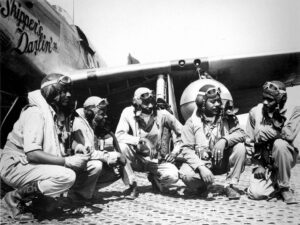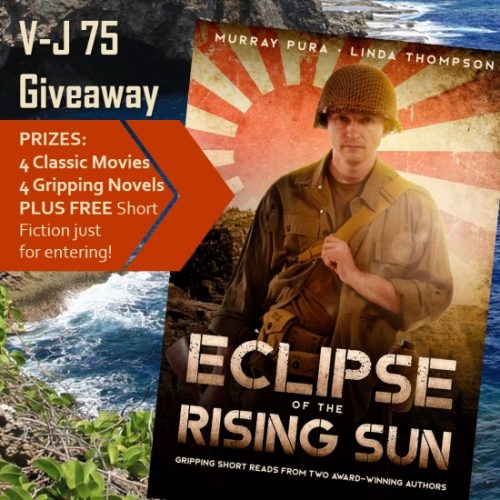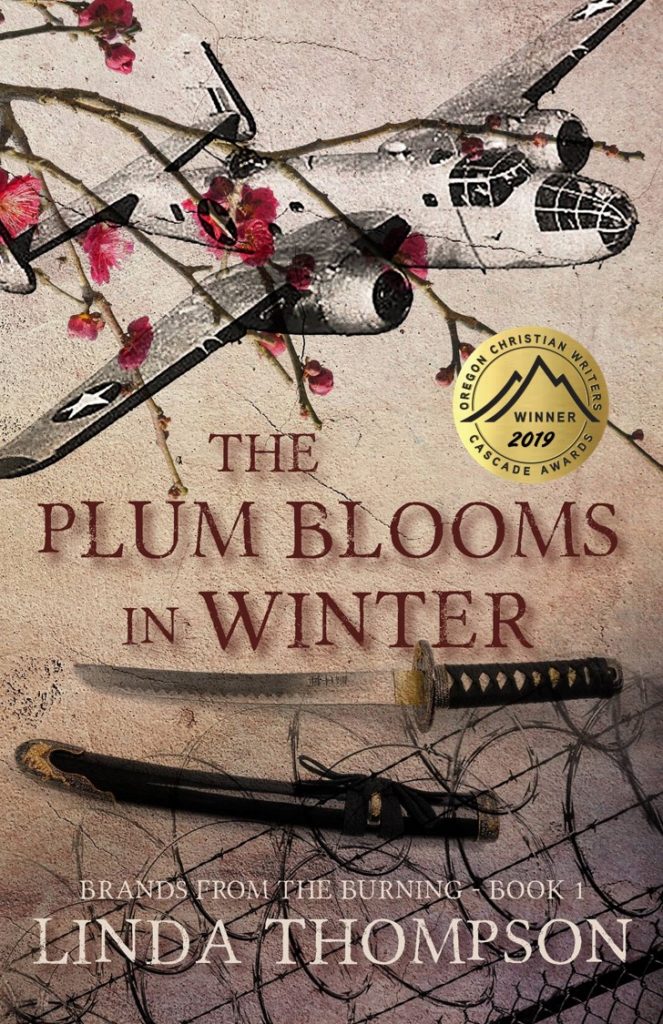Home \ Blog \ Reflections On V-J 75 And WWII’s End: What Makes America Worth Preserving?
Reflections On V-J 75 And WWII’s End: What Makes America Worth Preserving?
Reinforcements wade to the beach at Saipan, June 1944
Yesterday marked the seventy-fifth anniversary of a momentous occasion. When Japanese foreign affairs minister Mamoru Shigemitsu boarded USS Missouri and signed the Instrument of Surrender on September 2, 1945, the deadliest war in history finally drew to a close. And yet, given the challenges we face in the here and now, I am concerned this occasion will pass without much notice. Which leaves me musing.
Last summer at a writers’ conference, I heard a wonderful talk by Francine Rivers. One of many things she said that stuck with me was, “My stories often start with a question.”
I relate to that! My author journey was born when my husband showed me a paragraph in a WWII history book. It was a true account of a young Japanese woman who plotted to assassinate a former P.O.W. who had become a Christian missionary. But when she heard his message of the power of faith and forgiveness, it moved her so deeply she became a Christian instead.
That account raised questions that haunted me. I confess I had a stereotypical image of Japanese womanhood, and it was all about the softer arts—haiku and tea ceremonies. Why would this woman have wanted to assassinate a missionary? Those questions led me on a quest to gain a deeper understanding of a fascinating era in history. And to my debut novel, The Plum Blooms in Winter. It was such a thrill to see that story become an award winner!

The crew of Bat Out of Hell poses before their mission with their B25. Captured in occupied China, these wartime heroes inspired key characters in The Plum Blooms in Winter.
My current W.I.P., A Matter of Mind and Heart, releases in just a few days. You can register now to receive a free copy of this novelette on launch day, and as a bonus it comes with a giveaway drawing for a gift basket of powerful tales of the Pacific War! (More details below.) Although the story is set against the backdrop of WWII, it grapples with one of the most divisive questions of our day.
What does it mean to be an American? And why is America worth preserving?
I ran across a statement by Franklin D. Roosevelt which moved me to the core.
[bctt tweet=”Americanism is a matter of the mind and heart; Americanism is not, and never was, a matter of race or ancestry. – FDR, February 1, 1943 via @lthompsonbooks”]“The principle on which this country was founded and by which it has always been governed is that Americanism is a matter of the mind and heart; Americanism is not, and never was, a matter of race or ancestry.” – President Franklin D. Roosevelt, February 1, 1943
Yes, exactly! At our best, we live out the “self-evident truth” that all people “are created equal… endowed by their Creator with certain unalienable rights.”
But much as the sentiment stirs my heart, I read FDR’s words with a surge of outrage. Even as he wrote them, more than 110,000 Japanese Americans—80,000 of them U.S. citizens—languished in desolate concentration camps thrown up as a result of his Executive Order 9066. He had signed that order less than a year before penning those words.
Nisei—second-generation Japanese Americans—recruited from those internment camps made a tremendous contribution to Allied victories in the Pacific and in Italy. And they’re not an isolated example.


Eleanor Roosevelt proved a powerful advocate for Japanese Americans in the “relocation” camps, as well as for the Tuskegee Airmen. Here, she visits the Gila River relocation camp—which I was intrigued to discover once stood about fifteen miles from where I live.
Many Hurdles for Black Airmen
Tuskegee Airman Charles McGee’s father, an AME pastor in the Midwest, instilled in him a belief that all people stand as brothers and sisters before God, regardless of skin color. An outstanding student, Charles enrolled in R.O.T.C. at the University of Illinois. He was accepted into the experimental Tuskegee Airmen’s training program in Alabama.
The discrimination he had experienced growing up did not prepare him for life in the South.
“As the train left Southern Illinois, you had to change your location in the car…. You could feel the change in atmosphere….”
– Charles McGee
“Everything [on base] was black or white. They wouldn’t let black officers in the white officers’ club…. We went to the movie theater and they had a sign up that said, ‘Blacks in the back.’”
– Tuskegee Airman Roscoe Brown
The Army’s segregation rules dictated that black officers could not serve over white men. Qualified black pilots could not receive their commissions until black crews and a full complement of mechanics and supporting staff had also been trained. Army policy restricted black officers to assignments in “predominately black nations.” But the need was great enough that 355 Tuskegee airmen saw combat over Italy and Germany anyway.
Tuskegee Airmen in Italy
The Tuskegee Airmen’s Legacy
“They have a saying that excellence is the antidote to prejudice; so, once you show you can do it, some of the barriers will come down.”
– Roscoe Brown
The group’s record proved exemplary. They flew over 1500 missions, losing only 27 bombers they escorted.
Eighty-four Tuskegee Airmen lost their lives. Thirty-two were captured. CBN has produced a riveting video clip in which Tuskegee Airman Harold Brown credits God with intervening twice to save his life after his P-51 went down in Germany.
“You realize somebody, somebody had to be looking out for you; somebody had to be taking care of you. And there’s only one somebody in the world who I know is capable of doing that—God.”
– Harold Brown
Nisei from the internment camps. Black “Tuskegee Airmen.” Native American “code talkers” who enlisted from reservations. These people of color faced racial barriers we would never conceive of tolerating today. Yet they served with distinction and pride in every theater of the war.
We Hold These Truths
So do America’s “self-evident truths” apply to some but not to others? If so, what makes her worth fighting for? When the nisei in my story A Matter of Mind and Heart sees action for the first time against Japan in the Pacific, he must come to grips with this question.
One answer was expressed very memorably by a group of men who spent most of WWII as prisoners of the Japanese army—the Doolittle Raiders captured in rural China in April 1942. These heroes inspired several of my characters in The Plum Blooms in Winter. Here they reflect on that experience:
“In the hundreds of lonely hours we spent trying to retain our sanity… one of the documents we remembered and recited to ourselves was the Declaration of Independence.
‘We hold these truths to be self-evident, that all men are created equal, that they are endowed by their Creator with certain unalienable rights, that among these are life, liberty and the pursuit of happiness. That to secure these rights, governments are instituted among men, deriving their just powers from the consent of the governed…’
The meaning of those words really comes home to you when you are confined by a brutal enemy who totally reject the concept of individual liberty.”
– Four Came Home (Carroll V. Glines, 1995)
The U.S.A. is the longest-standing and most successful experiment with the idea that “we the people” are fit to govern ourselves. That government exists to serve its people—who are all equal before the law—and not the other way around. That we don’t need a privileged class born to rule over us, or an authoritarian central government to dictate what’s best for us.
Has this American experiment been perfect? Clearly not. But I contend it has only improved over time, as the ideals expressed in our founding documents have become real for more and more people. And I defy anyone to point to a system that works better for its constituents than this one does.

President Trump recently helped former Tuskegee Airman Charles McGee celebrate his hundredth birthday (!!) by granting him a long-overdue promotion to Brigadier General.
I’ll close with a reflection from actor and activist George Takei (of Star Trek fame), who spent years of his childhood in “relocation camps.”
“The U.S. proved itself big enough and confident enough to acknowledge [this] grave error and pay for it…. Many people… have a lot vested in one version of history that is more flattering to themselves and their legacies. Today, given the climate of fear and prejudice that has once more gripped our land, it is more important than ever that we remember the past truthfully.” – George Takei, February 2017
Expanded from a post originally presented at ChristianFictionAuthors.com.
FREE FICTION EBOOK PLUS GIVEAWAY
Register now for your chance to counter “cancel culture” with up to TEN gripping stories commemorating V-J 75. It’s worth remembering!
You’ll receive a FREE eBook, Eclipse of the Rising Sun, with two new works of short fiction by two award-winning authors… just for entering! Eclipse of the Rising Sun features:
- Black Sand by Murray Pura
1949: Now we call it PTSD. In the past it was “shell shock” or “combat fatigue.” Three men returned from the war in the Pacific but they could not shake it. It would take the women who loved them to bring the healing that would make them whole.
“Pura’s best writing!” – Award-winning author Parris Afton Bonds - A Matter of Mind and Heart by Linda Thompson
1944: Recruited from an internment camp for Japanese Americans, army linguist Rich Takahashi grapples with a key question. Why should he put his life at risk for an America that robbed him of his future, and his family and his sweetheart of their freedom? What makes an American, an American?
Plus, sign up now for your chance to win classic stories of the Pacific war, including FOUR movies and FOUR signed novels.
(Full details here.)

Linda Thompson stepped back from a corporate career that spanned continents to write what she loves—stories of unstoppable faith. Her debut novel, The Plum Blooms in Winter, is an O.C.W. Cascade Award winner and a finalist for several 2019 awards: Christy and Carol Awards, plus the International Book Award in two categories. Linda writes from the sun-drenched Arizona desert, where she lives with her husband, a third-generation airline pilot who doubles as her Chief Military Research Officer, one mostly-grown-up kid, and a small platoon of housecats. When Linda isn’t writing, you’ll find her rollerblading—yes, that does make her a throwback!—enjoying their first grandchild, or taking in a majestic desert moonrise.
He made aviation history in WWII’s daring Doolittle Raid. Now he’s downed and on the run.
She wants to bury a knife in him. Can her victim offer redemption instead?
“A taut, crisp debut achievement that colorfully evokes the Pacific theater of WWII. Start this one forewarned: it’s a stay-up-all-night read.” –Jerry B. Jenkins, 21-time New York Times bestselling author
Winner, 2019 Cascade Award |
Finalist, 2019 Christy and Carol Awards |
Inspired by Actual Events
1942. Pilot Dave Delham revels at the success of his historic Japanese bombing mission. Until he’s caught and endures years of torture at the hands of cruel captors. Despairing that he’ll survive, Dave vows if he escapes, he’ll answer God’s call on his life.
Osaka, Japan, 1948. Miyako Matsuura longs to restore her family’s shattered honor. After watching her little brother die in a horrific American air raid, she was reduced to selling her body to survive. When the pilot whose bomb stole her brother’s life returns as a missionary, her thirst for revenge consumes her.
Two damaged people race along a collision course that could bring eternal change. Can Dave and Miyako transform their tragic histories and surrender to forgiveness and faith?
A Cascade Award Winner | Christy & Carol Finalist

Find Me
Recent Comments
Post Archives
- September 2021
- July 2021
- June 2021
- May 2021
- April 2021
- February 2021
- December 2020
- October 2020
- September 2020
- August 2020
- July 2020
- June 2020
- April 2020
- March 2020
- December 2019
- November 2019
- October 2019
- May 2019
- April 2019
- March 2019
- February 2019
- December 2018
- November 2018
- October 2018
- September 2018
- August 2018
- July 2018
- June 2018
- May 2018
- April 2018
- March 2018
- January 2018
- December 2017
- November 2017
- October 2017
- September 2017
- August 2017
- July 2017
- April 2017
- March 2017
- February 2017
- January 2017
- September 2016
- August 2016





No Comments